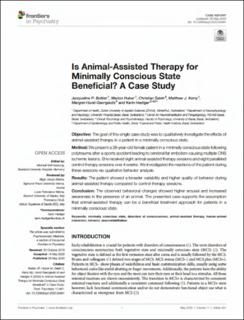Please use this identifier to cite or link to this item:
https://doi.org/10.21256/zhaw-26025Full metadata record
| DC Field | Value | Language |
|---|---|---|
| dc.contributor.author | Boitier, Jacqueline Patrice | - |
| dc.contributor.author | Huber, Marion | - |
| dc.contributor.author | Saleh, Christian | - |
| dc.contributor.author | Kerry-Krause, Matthew J. | - |
| dc.contributor.author | Hund-Georgiadis, Margret | - |
| dc.contributor.author | Hediger, Karin | - |
| dc.date.accessioned | 2022-11-11T10:53:12Z | - |
| dc.date.available | 2022-11-11T10:53:12Z | - |
| dc.date.issued | 2020 | - |
| dc.identifier.issn | 1664-0640 | de_CH |
| dc.identifier.uri | https://digitalcollection.zhaw.ch/handle/11475/26025 | - |
| dc.description.abstract | Objective: The goal of this single case study was to qualitatively investigate the effects of animal-assisted therapy in a patient in a minimally conscious state. Method: We present a 28-year-old female patient in a minimally conscious state following polytrauma after a sports accident leading to cerebral fat embolism causing multiple CNS ischemic lesions. She received eight animal-assisted therapy sessions and eight paralleled control therapy sessions over 4 weeks. We investigated the reactions of the patient during these sessions via qualitative behavior analysis. Results: The patient showed a broader variability and higher quality of behavior during animal-assisted therapy compared to control therapy sessions. Conclusion: The observed behavioral changes showed higher arousal and increased awareness in the presence of an animal. The presented case supports the assumption that animal-assisted therapy can be a beneficial treatment approach for patients in a minimally conscious state. | de_CH |
| dc.language.iso | en | de_CH |
| dc.publisher | Frontiers Research Foundation | de_CH |
| dc.relation.ispartof | Frontiers in Psychiatry | de_CH |
| dc.rights | http://creativecommons.org/licenses/by/4.0/ | de_CH |
| dc.subject | Animal-assisted therapy | de_CH |
| dc.subject | Behavior | de_CH |
| dc.subject | Disorder of consciousness | de_CH |
| dc.subject | Human-animal interaction | de_CH |
| dc.subject | Minimally conscious state | de_CH |
| dc.subject | Neurorehabilitation | de_CH |
| dc.subject.ddc | 615.8515: Ergotherapie | de_CH |
| dc.subject.ddc | 616.8: Neurologie und Krankheiten des Nervensystems | de_CH |
| dc.title | Is animal-assisted therapy for minimally conscious state beneficial? : a case study | de_CH |
| dc.type | Beitrag in wissenschaftlicher Zeitschrift | de_CH |
| dcterms.type | Text | de_CH |
| zhaw.departement | Gesundheit | de_CH |
| zhaw.organisationalunit | Institut für Public Health (IPH) | de_CH |
| dc.identifier.doi | 10.3389/fpsyt.2020.00491 | de_CH |
| dc.identifier.doi | 10.21256/zhaw-26025 | - |
| dc.identifier.pmid | 32547434 | de_CH |
| zhaw.funding.eu | No | de_CH |
| zhaw.issue | 491 | de_CH |
| zhaw.originated.zhaw | Yes | de_CH |
| zhaw.publication.status | publishedVersion | de_CH |
| zhaw.volume | 11 | de_CH |
| zhaw.publication.review | Peer review (Publikation) | de_CH |
| zhaw.funding.snf | 174082 | de_CH |
| zhaw.author.additional | No | de_CH |
| zhaw.display.portrait | Yes | de_CH |
| Appears in collections: | Publikationen Gesundheit | |
Files in This Item:
| File | Description | Size | Format | |
|---|---|---|---|---|
| 2020_Boitier-etal_Animal-assisted-therapy-minimally-conscious-state-beneficial_fpsyt.pdf | 12.07 MB | Adobe PDF |  View/Open |
Show simple item record
Boitier, J. P., Huber, M., Saleh, C., Kerry-Krause, M. J., Hund-Georgiadis, M., & Hediger, K. (2020). Is animal-assisted therapy for minimally conscious state beneficial? : a case study. Frontiers in Psychiatry, 11(491). https://doi.org/10.3389/fpsyt.2020.00491
Boitier, J.P. et al. (2020) ‘Is animal-assisted therapy for minimally conscious state beneficial? : a case study’, Frontiers in Psychiatry, 11(491). Available at: https://doi.org/10.3389/fpsyt.2020.00491.
J. P. Boitier, M. Huber, C. Saleh, M. J. Kerry-Krause, M. Hund-Georgiadis, and K. Hediger, “Is animal-assisted therapy for minimally conscious state beneficial? : a case study,” Frontiers in Psychiatry, vol. 11, no. 491, 2020, doi: 10.3389/fpsyt.2020.00491.
BOITIER, Jacqueline Patrice, Marion HUBER, Christian SALEH, Matthew J. KERRY-KRAUSE, Margret HUND-GEORGIADIS und Karin HEDIGER, 2020. Is animal-assisted therapy for minimally conscious state beneficial? : a case study. Frontiers in Psychiatry. 2020. Bd. 11, Nr. 491. DOI 10.3389/fpsyt.2020.00491
Boitier, Jacqueline Patrice, Marion Huber, Christian Saleh, Matthew J. Kerry-Krause, Margret Hund-Georgiadis, and Karin Hediger. 2020. “Is Animal-Assisted Therapy for Minimally Conscious State Beneficial? : A Case Study.” Frontiers in Psychiatry 11 (491). https://doi.org/10.3389/fpsyt.2020.00491.
Boitier, Jacqueline Patrice, et al. “Is Animal-Assisted Therapy for Minimally Conscious State Beneficial? : A Case Study.” Frontiers in Psychiatry, vol. 11, no. 491, 2020, https://doi.org/10.3389/fpsyt.2020.00491.
Items in DSpace are protected by copyright, with all rights reserved, unless otherwise indicated.